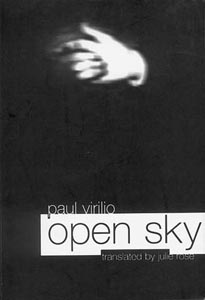
Genealogy of Change: Paul Virilio traces the rapid trajectory of techno-history in a postmodernist rant.
Open Sky
By Paul Virilio
Verso, $16 paper
Don't believe the cyberhype: from 'Open Sky' comes a bleak view of a virtual dystopia
By Eric Johnson
PAUL VIRILIO'S ideas sound a bit like they're coming from the mouth of a late-'60s sci-fi movie character--some philosopher-of-the-future warning about dangers hidden in a powerful new imaginary technology. But his new book, Open Sky, is nonfiction, a work of theory, a profound critique of the communications technologies that have become so commonplace so quickly that nobody's given much critical attention to what they mean.
Virilio, a French writer whose books are stacked alongside postmodernists like Foucault and Baudrillard, argues here that our relationship with day-to-day reality has been transformed in dark and frightening ways. By allowing us to communicate and interact instantaneously and at great distances, he says, our email and cell-phones have pulled us out of the world. In the brave new virtual universe, the fundamental elements of reality--space and time--have been collapsed. And that, he says, is the tragedy.
There are three wild ideas here: that technological revolutions change the actual shape of "nature," that the Internet bears just such shape-shifting power and that its effect is pernicious.
Open Sky clearly lays out these three arguments over 152 pages in nine chapters that say the same thing nine different ways. Virilio accomplishes this intricate goal with the imagination, irony, and political edge that mark the best contemporary theory. And forget the myth that these French guys are impenetrable. Readers with a taste for cool new ideas will find the book fairly accessible, if pleasurably dizzying, regardless of their opinions about its conclusions.
Describing his dystopian virtual universe, Virilio makes his prose do somersaults through flaming conceptual hoops, inventing new words to explain ideas that would be difficult to reach if the trip weren't so much fun.
VIRILIO BEGINS by introducing the notion of the "life-size"--a human point of view derived from our physical relationship to the natural world. This attitude has ruled human perception since the dawn of time, Virilio says, and has been under attack throughout the technological era--until being dealt a fatal blow by the widespread use of fiber-optic cable.
He laments the conquest of time and space, and the destruction of the human-scale environment, with poetic passages about sea journeys lifted from 17th-century sailors' diaries and horror stories of insanity told by former astronauts.
In five paragraphs, in a chapter called "The Law of Proximity," Virilio traces a "genealogy of technology" beginning with the ox-drawn cart and culminating with inventions yet to reach the market. He moves in a rapid trajectory through techno-history, from "communications prostheses: the mobile phone, Walkman, portable computer or TV, to say nothing of the DataGlove or DataSuit" and off into "the future transplantation revolution, and the ingurgitation of micromachines ... substances produced by microprocessors, 'stimulant' implants, cellular automata. ..."
Half-paranoid rant, perhaps, but this is not science fiction; the stuff Virilio describes is "real." To challenge this nightmarish Bladerunner-esque scenario, he wonders: "Would it not be appropriate to set up a gray ecology alongside the green? Being eternally preoccupied by the pollution of nature, are we not deliberately overlooking the pollution of the life-size which reduces to nothing earth's scale and size?"
Readers may not be inspired to abandon their email addresses (I'll admit that I read parts of Open Sky while waiting for Web pages to download). But it does change the look of the neighborhood on a walk to the library.
[ Metro | Metroactive Central | Archives ]
![[Metroactive Books]](/books/gifs/books468.gif)